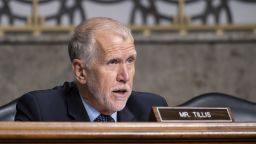Editor’s Note: Alberto Gonzales was the 80th attorney general of the United States and counsel to the president in the George W. Bush administration. He is now the dean and Doyle Rogers Distinguished Professor of Law at Belmont University College of Law and is on the advisory board for the Vanderbilt Project on Unity & American Democracy. The views expressed in this piece are his own. View more opinion on CNN.
There are spots on our southern border that change us, images that force us to grapple with ourselves. I’ve stood on a bluff and had the 200,000-square-mile Chihuahuan Desert stare back at me, asking why we stain its sand with the blood of children.
Why do we turn away from the suffering of our brothers and sisters who journey into the heat and leave their lives and dreams in its canyons? Why do we tolerate an immigration system that punishes the desperate and the patient alike — one that is simultaneously incapable of providing sufficient lawful workers to the US or effective border security?

Why do migrants keep crying out: “No, no, I’m staying here. I’m going to try and get through”? These questions prompt me to think we must come together as one country and compromise toward a solution that secures our border and respects the rule of law and the humanity of all people.
Our long-overdue charge is to unify and pass comprehensive immigration reform and do so now, including Congress accepting reasonable proposals to enhance border security as part of a larger foreign aid package. This smaller compromise may lay a strong foundation for a more comprehensive plan.
Until now, I have drawn my own lines in the sand. For example, I discounted ideas like building a long, expensive border wall and deploying our military. I believed a wall sent the wrong message to our neighbors and was a waste of money. I feared our military, trained to kill an enemy, would do just that to unarmed migrant families mistaken for criminals, terrorists or cartel members. In the past, I cut off discussions on such measures and blocked opportunities for compromise — preferring more border agents and technology like cameras and motion sensors.
Today, however, we are in crisis, exacerbated by legislative stalemate which neither heeds the cries of migrants fleeing violence nor voters’ desires for reasonable limitations on entry. Our communities are overwhelmed with migrants and their needs, especially as states near the border continue to bus new arrivals north.
The ideas we’ve considered have yet to coalesce into solutions. So, I have challenged myself to be open to other possibilities — at least during this crisis. As former Sen. Howard Baker said: “The other guy might be right,” and until now, the uncompromising ideological positions of both political parties have proved wrong. Americans agree.
In a recent poll by the Vanderbilt Project on Unity & American Democracy, 80% of respondents expressed support for legislative compromise even when including challenging real-life scenarios.
Article I of our Constitution gives Congress, not the President, the power to establish a “uniform Rule of Naturalization,” i.e., immigration policy. In normal circumstances, the President is limited by the immigration tools Congress bestows in the form of legislation.
Today, however, the situation at the border has reached a breaking point. We must gain control.
What I have concluded is that the President may have to rely on his constitutional emergency powers to implement temporary measures, such as constructing physical barriers at strategic locations and using our military in a support role under limited circumstances and well-understood rules of engagement.
During this crisis, the US should consider limiting the number of grants for asylum-seekers and temporarily suspending new applicants for lawful status to get our house in order and regain command of our borders. We must identify and remove immediately anyone who is a threat.
After control is regained, our country can return its attention to a more comprehensive immigration plan consistent with our values — one that is fair to those immigrants who followed the rules waiting patiently outside our borders, one that promotes economic growth, one that neither rewards nor incarcerates those who entered the country without necessary paperwork, and one that protects US citizens and property.
Nonetheless, it’s important to reiterate that comprehensive immigration policy reform is necessary and the ultimate goal.
The President must lead, and Congress must legislate and appropriate. Every day that we wait, more people die in that desert, crops go fallow without workers, supply chains are delayed and the entrepreneurial spirit of this country, fueled — ironically — by immigrants, is dulled.
Cities across America no longer have the currency or capacity to pay the costs of Congress’ pride and stubbornness. As CNN has reported, record numbers of migrants are crossing into the US, overwhelming cities like New York and Chicago.
It has been the constitutional duty of every lawmaker of this millennium to find a solution, and we have failed. We must be humble and put our ideologies aside — and protect our citizens, the rule of law and the immigrants seeking a better life for their families.
And as citizens, we must extend grace to our lawmakers, so they feel confident doing what they know is right, and compromising without fear of reprisal.
Immigration policy affects our economy, our national security and our foreign policy, as well as relationships with family and friends. It influences the very essence of who we are as a country.
When not properly implemented, such policy threatens our peace and stability.
Once we embrace a long-term comprehensive framework, we will be stronger and safer in an increasingly dangerous world — unified and better able to take on the challenges ahead, together.





